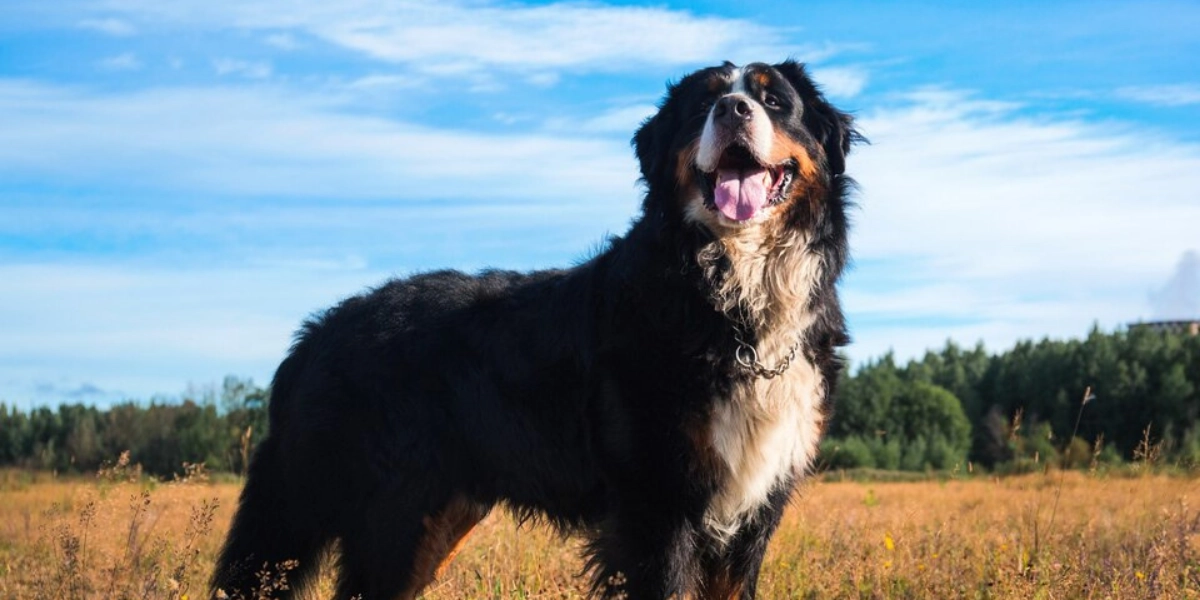Golden Mountain Dog: Loyal, Loving & Family-Friendly
Introduction to the Golden Mountain Dog
The Golden Mountain Dog is a stunning, affectionate hybrid breed that combines the best traits of two beloved purebreds: the Golden Retriever and the Bernese Mountain Dog. Known for their calm nature, loyal personality, and striking good looks, Golden Mountain Dogs are gaining popularity as ideal family pets.
Whether you’re a first-time dog owner or a seasoned dog lover looking for a gentle giant, this breed offers the perfect mix of friendliness, intelligence, and loyalty.
Origin and Breed History
Golden Mountain Dogs are a relatively new designer breed, first intentionally bred within the past two decades. The goal was to combine the playfulness and sociability of the Golden Retriever with the strength, loyalty, and gentle nature of the Bernese Mountain Dog.
- Golden Retriever Origin: Originally bred in Scotland in the 19th century as a gun dog, Golden Retrievers are known for their obedience, intelligence, and love for people.
- Bernese Mountain Dog Origin: Hailing from Switzerland, Bernese Mountain Dogs were used as working dogs for pulling carts and guarding farms. They’re affectionate, calm, and excellent with children.
By combining these breeds, the Mountain Golden Dog (another name you might hear) is born — a dog that is both friendly and dependable, with a majestic presence.
Appearance and Physical Traits
Golden Mountain Dogs are large, majestic dogs with a strong and graceful build. They often inherit the striking tri-color markings of the Bernese and the soft, golden shades of the Retriever.
General Physical Features:
- Weight: 75 to 120 pounds
- Height: 24 to 28 inches at the shoulder
- Coat: Medium to long, thick double coat
- Colors: Golden, black, white, rust, or a combination (especially with tri-color patterns)
Their expressive eyes and slightly drooping ears give them a kind and approachable look — and that’s exactly how their temperament matches.
Temperament and Personality
Golden Mountain Dogs are best known for their gentle, loving, and loyal nature. These dogs are people-oriented and do best when they are part of a close-knit family environment.
Key Personality Traits:
- Extremely affectionate
- Loyal and protective without aggression
- Gentle with children and small animals
- Playful yet calm when indoors
- Eager to please and trainable
Because of their sweet and sociable personality, they’re often considered ideal therapy and emotional support dogs.
Golden Mountain Dog Lifespan and Health
How long do Golden Mountain Dogs live?
The golden mountain dog lifespan typically ranges between 9 to 15 years, depending on factors like genetics, diet, exercise, and healthcare.
While hybrid vigor can improve overall health, both parent breeds are prone to certain conditions:
Common Health Issues:
- Hip and elbow dysplasia
- Cancer (especially from the Bernese side)
- Heart conditions
- Bloat (gastric torsion)
- Degenerative myelopathy
- Allergies and skin problems
Preventative care, such as regular vet check-ups, healthy nutrition, and exercise, plays a major role in extending their lifespan.
Grooming and Coat Care
Golden Mountain Dogs have thick, double coats that shed year-round, with heavier shedding in the spring and fall.
Grooming Tips:
- Brushing: 3–4 times per week (daily during shedding season)
- Bathing: Every 6–8 weeks or when needed
- Nail trimming: Every 3–4 weeks
- Ear cleaning: Weekly (to prevent infections)
- Teeth brushing: 2–3 times a week
Regular grooming also helps you monitor their skin health and spot potential issues early.
Training and Socialization
Golden Mountain Dogs are intelligent and eager to please, making them relatively easy to train — especially with positive reinforcement techniques.
Training Tips:
- Start early with basic commands
- Use praise, treats, and consistency
- Keep training sessions short and fun
- Socialize with dogs, people, and environments from puppyhood
They respond well to gentle, firm leadership and make excellent students in obedience classes.
People Also Read:
Happy Journey Wishes
Ideal Home Environment
Golden Mountain Dogs thrive in homes where they are included as part of the family. Due to their size and energy levels, they are best suited for:
- Homes with fenced yards
- Families with children or other pets
- Active households that enjoy outdoor time
- Owners who can commit to grooming and companionship
They may not do well in apartments or with owners who are away for long hours regularly.
Exercise Needs and Activity Levels
Despite their calm indoor demeanor, Golden Mountain Dogs require moderate to high levels of physical activity to stay healthy and happy.
Exercise Needs:
- 1 to 2 hours of activity per day
- Walks, hikes, and playtime
- Swimming is often a favorite!
- Puzzle toys and obedience training for mental stimulation
Without enough exercise, they may become bored and develop destructive behaviors.
Diet and Nutritional Requirements
Feeding a Golden Mountain Dog a balanced, high-quality diet supports their growth, coat health, and energy levels.
Dietary Tips:
- Choose a formula suited for large breeds
- Avoid overfeeding — they’re prone to obesity
- Provide clean, fresh water at all times
- Include joint-supporting supplements (glucosamine, omega-3s)
Adult dogs typically eat 3 to 5 cups of dry food per day, split into two meals. Monitor weight and adjust portions as needed.
Golden Mountain Dog with Children and Other Pets
One of the biggest strengths of Golden Mountain Dogs is their gentle nature with kids and other animals.
With Children:
- Naturally patient and protective
- Great playmates for active kids
- Teach children how to respectfully interact
With Other Pets:
- Generally friendly with other dogs
- Can coexist peacefully with cats
- Early socialization helps prevent prey-chasing behavior
Their loyalty and tolerance make them one of the best choices for multi-pet or multi-child homes.
Adoption and Breeder Information
If you’re considering bringing a Golden Mountain Dog home, you have two main options:
Reputable Breeders:
- Look for ethical breeders who perform health testing
- Visit the facility and ask to meet the puppy’s parents
- Avoid puppy mills or online listings with no verification
Adoption:
- Search breed-specific rescue groups
- Check local shelters for retriever or mountain dog mixes
- Adoption can save a life and be more affordable
Average cost from a breeder: $1,200 – $3,000, depending on lineage and location.
Pros and Cons of Owning a Golden Mountain Dog
✅ Pros:
- Extremely loyal and loving
- Great with children and families
- Intelligent and easy to train
- Beautiful, expressive appearance
- Good for emotional support and therapy work
❌ Cons:
- Heavy shedders (not hypoallergenic)
- Prone to certain health issues
- Requires regular grooming
- Not ideal for small living spaces
- Can suffer from separation anxiety
Understanding both the joys and challenges helps ensure you’re ready for the commitment.
Final Thoughts
The Golden Mountain Dog is a loving, gentle, and loyal companion who thrives in homes that offer attention, activity, and affection. With proper training, regular grooming, and a nurturing environment, this hybrid breed can bring years of joy and unconditional love to any family.
If you’re looking for a majestic, affectionate, and intelligent dog that blends the best of the Golden Retriever and Bernese Mountain Dog, the Golden Mountain Dog might just be your perfect match.
Frequently Asked Questions
Q1: How big do Golden Mountain Dogs get?
They typically weigh 75–120 lbs and stand 24–28 inches tall.
Q2: Are Golden Mountain Dogs hypoallergenic?
No. They shed heavily and are not suited for allergy sufferers.
Q3: How long do Golden Mountain Dogs live?
Their average lifespan is 9 to 15 years, depending on genetics and care.
Q4: Are they good for first-time dog owners?
Yes, with proper training and commitment, they make great companions for first-time owners.
Q5: Can they live in apartments?
Not ideal — they need space to move and play, preferably with a yard.







One Comment